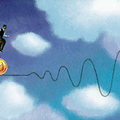Bare Feet, Sand Stairs and Isolation to Suit a Prince

A guest tests the waters at Mike’s Camp on Kiwayu Island. Reached by a two-hour flight from Nairobi, Kiwayu draws occasional celebrities but not many tourists.
WHEN your boat cuts its engine at Mike’s Camp, you know it’s time to turn the BlackBerry off. The dock at this Indian Ocean resort, perched on the spine of Kiwayu Island, off the coast of Kenya, is pure Gilligan’s Island, a stick and twine arrangement jutting out from the bush. It leads to a flight of stairs made of sand (I know, it doesn’t sound possible, but it is). Glancing back, past where you have just stepped off your boat, all you see are ribbons of water, green islands and sky.
You’re climbing, but you’re also sinking into vacation mode. The guide tells you to lose your shoes so you can walk better in the sand. He takes your bag. And then you arrive, barefoot and maybe a little thirsty, which is perfect for the cold cocktail that is about to be thrust into your hand, at big thatched-roof bungalow. Everyone — and everything — is in total relaxation mode. Mike’s dog Tigger is prostrate on the palm-matted floor, a few fuzzy cats bask in the sun, and other than the shell mobiles tinkling in the breeze, everything is still.
Mike’s Camp has a lot going for it — the Zen vibe, the tasty Swahili food, the beaches straight out of the paradise manual, and the bucket shower. Call it rough-lux. It’s located on a choice strip of the Kenyan coast that is wild and beautiful but gets very few visitors.
While Lamu, another Indian Ocean island about 30 miles south of Kiwayu, has been thoroughly discovered, and the coastal city of Mombasa has the big hotels, the long arm of the tourist trade has barely touched Kiwayu. There are just two exclusive resorts, Mike’s Camp, also known as Munira Island Camp, and Kiwayu Safari Village. Both are stunning. Neither is especially easy on the wallet. And because of their seclusion and privacy, the two of them have become something of a hide-out for folks like Prince William and Mick Jagger.
Kiwayu may be remote, but it is actually not all that hard to get to. SafariLink, an airline based in Nairobi, makes stops in Kiwayu en route to Lamu if there are two or more passengers, which usually translates into daily service and an easy leg to add to any East African safari. On the two-hour flight, I couldn’t get over how green and forested this part of Kenya is. The trees are packed so closely together, it looks as if you couldn’t slide a credit card between them. When we landed at a dirt airstrip, there was just a single Land Rover waiting in the shade, which took us to Kiwayu Safari Village, a resort owned by an Italian family.
How else to judge their influence but by the food? Lunches were the classic Italian two-step of primi piatti and secondi like risotto with asparagus and cracked crab.
And dinners were definitely something to write home about. At the conch shell’s call, my wife, Courtenay, and I, along with another couple we were traveling with, were summoned to the lounge for seaweed tempura and mini raw oysters — gourmet hors d’oeuvres masquerading as bar snacks. We then walked to the beach, where we feasted on calamari and enormous skewered shrimp at a candle-lit table planted in the sand. The sky was wallpapered with stars, all the way down to the horizon. (After dinner, we were presented with the only hunk of Taleggio I have seen on the continent.)
We waddled back to our room, a luxurious bungalow with soft lighting, a solar-heated shower and a giant clam shell at the entrance to rinse our feet. There were no doors, no hinges and no glass.
While I sank into bed, thinking, if this is good enough for Mick, it’s good enough for me, I heard something, something clicking.
Claws? The mosquito net apparently kept out more than just mosquitoes: a pink crab was scaling the wall of fabric. A gentle swat sent it sidestepping back to the sand.
The next morning, we explored nearby Mkokoni village, where the women offered us toy fish carved from washed up flip-flops.
Trolling the endless beaches is just one way to spend the day. Other options include picnics, dhow sailing or game drives into the bush right behind the resort, which is teeming with lions, giraffes, buffaloes and elephants. But most guests, the manager said, “just sit back and read books and love it.”
Sounds about right, I thought as I scanned the cushion-filled lounge, where two women in bikinis were dozing off to Norah Jones. I pondered the collision of this joint’s classy, European style with the predominantly Muslim local customs, remembering the laminated card in my room that warned “in the unlikely event of being approached when naked on the vast adjacent beaches, please cover yourselves.”
The owners of Kiwayu’s two resorts, thank goodness, are more friendly than competitive, and when it came time to go to Mike’s Camp, the staff at the safari village hailed Mike Kennedy, the camp’s owner, on the radio to send over a speedboat.
As soon as we arrived at the camp, one friend sighed: “Ah, the hippie version!” At Mike’s, instead of his and hers porcelain basins in the bungalow, there was a silver bowl for a sink. The shower was a bucket on a pulley. The toilet? Fill it yourself.
All the bungalows have priceless views, with miles of creeks and islands stretching to the west and the wide open Indian Ocean to the east. Space. That was the sense I had looking out from my room. Lots of space. I could even see Somalia, whose border is about 25 miles north, though none of that country’s chaos seemed able to reach me.
I spent my days in the water: water-skiing, snorkeling, boogie-boarding and diving off a coral cliff in a nearby village with 20 naked kids splashing and giggling around me. The resort is part of the Kiunga Marine National Reserve and home to sea tortoises and dugongs, a manateelike creature. But you’re allowed to fish, and Mike can arrange boats. He insisted that it’s easy to catch marlin, barracuda, swordfish, sailfish, wahoo, snapper and tuna. “It’s like a supermarket out there,” Mike said.
And that’s the thing about Mike’s. It’s really all about, well, Mike. He’s a cheery, freckled, 50-year-old Kenyan, whose father was a colonial tea farmer from Britain. He joined us for a snorkel and hung out with us afterward at the beach hut he built, strung with hammocks. He sipped a sundowner with us that evening, as the African sky glowed orange and purple and pink. During dinner, family-style, of course, he regaled us with stories about sailing up and down the Swahili coast and exploring little islands. “They’re wonderful,” he said. “You just sit there and chip oysters off the rocks with your white wine and Tabasco sauce.”
Mike’s a foodie, and he served a lip-smacking crab curry our first night. Then he said good night and padded down the sandy, moonlit path to his own bungalow.
VISITOR INFORMATION
GETTING THERE
Kiwayu is easily accessible by air from Nairobi’s Wilson Airport. SafariLink Aviation offers daily flights, at $365 round trip, from mid-December until mid-April and from July until the end of October, provided there are at least two passengers. For details, contact SafariLink at (254-720) 888111 or see www.safarilink-kenya.com/safari/. United States citizens need a visa to enter Kenya, which can be purchased on arrival for $50. (Many prices are given in United States dollars, which businesses readily accept.)
You can also hire a speedboat or dhow (a traditional sailboat) to Kiwayu from Lamu, a popular tourist destination 30 miles to the south. Speedboats take about one and a half hours and cost approximately $350. Dhows take about six hours and set you back $220.
WHERE TO STAY
There are only two resorts. The more luxurious is Kiwayu Safari Village, on Kenya’s mainland across the bay from Kiwayu Island, consisting of 18 thatched-roof bungalows strung along the shore, plus one off-shore honeymoon suite on Kiwayu Island. All are open-air and decorated with bright cloths, pillowed hammocks and traditional Swahili furniture. Italian meals with a coastal flair are served in the main lodge.
Bookings can be made at (254-735) 598858 or by sending e-mail to a reservation agent at kiwayu@kiwayu.com. Additional information can be found at www.kiwayu.com. The cost is $700 a night per couple, including all meals. Higher rates apply over the year-end holiday period, and there is an additional $20-a-day conservation fee. Payment can be made by credit card, although bank transfers are preferred. The resort is closed during the rainy season, April 15 to July 31.
Mike’s Camp, also known as Munira Island Camp, is on Kiwayu Island itself. The trip by motorboat from Kiwayu Safari Village takes about 15 minutes. The camp has only seven rustic bungalows nestled along the ridge of the island, with exceptional views of the Indian Ocean to the east and watery mangrove forests to the west. Mike Kennedy, the resort’s personable owner, gives this place a relaxed, homey feel. Bookings can be made at (254-20) 512213 or by e-mail at bigblue@africaonline.co.ke. A bungalow with full board is $440 a night for two people The resort is closed May through the middle of July.
WHAT TO DO
Kiwayu is a great place for relaxing with a good book and a fruity cocktail. Or taking long walks on the beach, either toward a deserted cove or a fishing village. For water lovers, there’s snorkeling, water-skiing, boogie-boarding, windsurfing, sailing and deep-sea fishing. The two resorts are smack in the middle of the Kiunga Marine National Reserve and the Dodori and Boni reserves, where you can see cheetahs, giraffes, lions and elephants.





